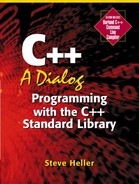T
Temporary; see temporary variable.
A temporary variable is automatically created by the compiler for use during a particular operation, such as a function call with an argument that has to be converted to a different type.
The keyword this represents a hidden argument automatically supplied by the compiler in every (non-static) member function call. Its value during the execution of any member function is the address of the class object for which the member function call was made.
To throw an exception means to cause an interruption in the normal flow control of a program, usually due to an error condition. An exception can be handled via a catch statement in a function that directly or indirectly called the function that threw the exception.
A token is a part of a program that the compiler treats as a separate unit. It's analogous to a word in English, while a statement is more like a sentence. For example, string is a token, as are :: and (, whereas x = 5; is a statement.
The keyword true is a predefined value representing the result of a conditional expression whose condition is satisfied. For example, in the conditional expression x < y, if x is less than y, the result of the expression will be true.
The keyword try is used to control a block from which an exception may be generated. If an exception occurs during execution of that block or any functions within that block, the following catch statement will be invited to handle the exception, assuming that the specification of the catch statement indicates that it is willing to handle such an exception.
The type of an object is the class to which it belongs. The type of a native variable is one of the predefined variable types in C++. See integer variable, floating-point variable, and bool for details on the native types.
The type system refers to the set of rules the language uses to decide how a variable of a given type may be employed. In C++, these determinations are made by the compiler (static type checking). This makes it easier to prevent type errors than it is in languages where type checking is done during execution of the program (dynamic type checking). Please note that C++ has both static type checking and dynamic typing. This is possible because the set of types that is acceptable in any given situation can be determined at compile time, even though the exact type of a given variable may not be known until run time.
